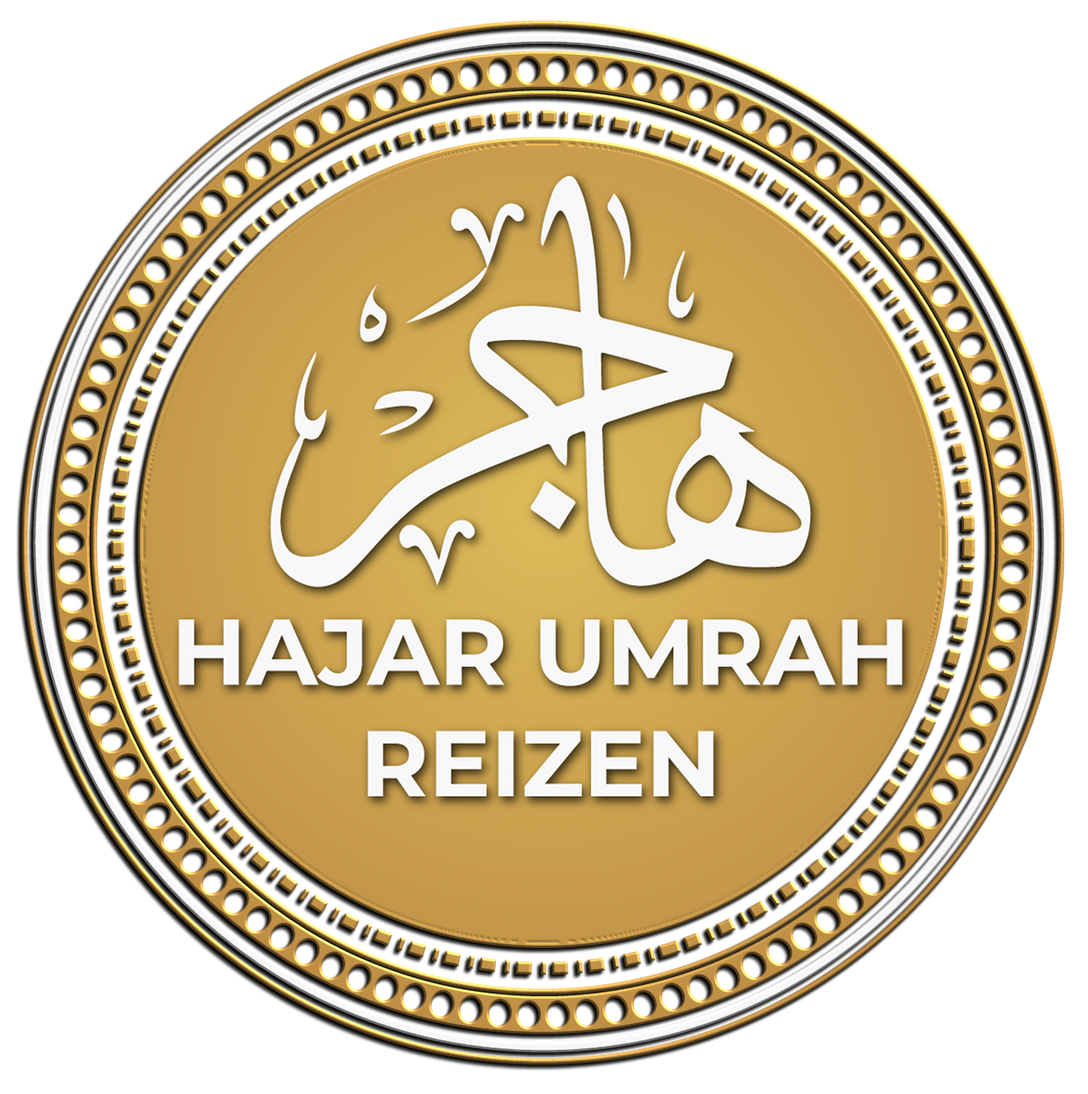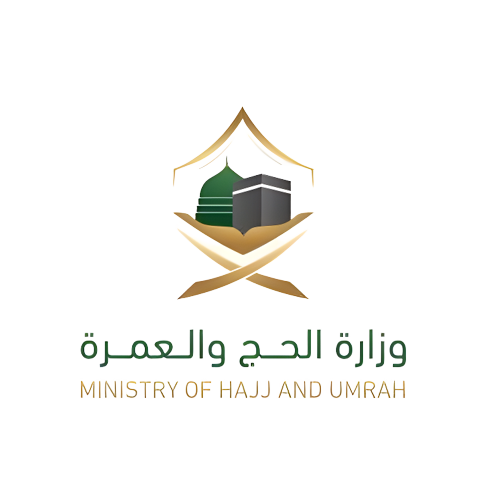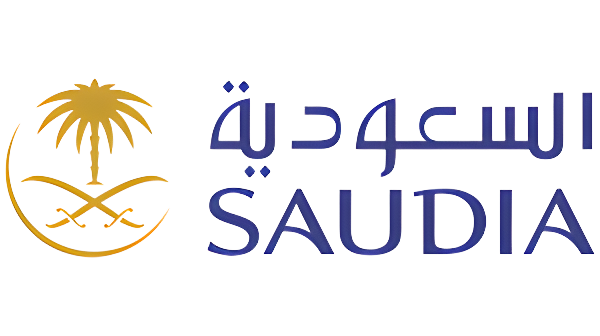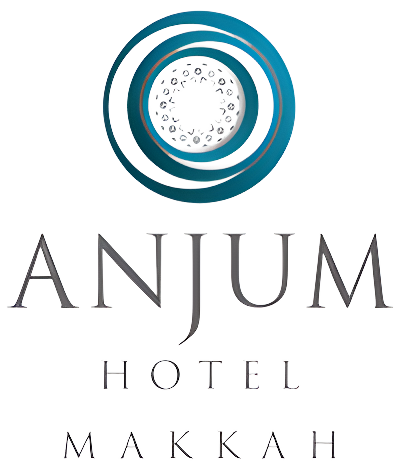UMRAH IN STEPS
Ihraam
Ihram state is the sacred state you assume when you begin the Hajj or Umrah. It is a state in which it is forbidden to do certain things that are allowed at other times. It is recommended to do 'Ghusl' before entering the state of Ihram; wash you completely. Then you put on your ihram clothes.
For the men, the clothing consists of unsewn fabric, which is not made in the shape of the body. It consists of an upper part (Ridaa') and a lower part (Izaar). Head coverings are not allowed. On the feet one can wear sandals; in any case, one should wear footwear that does not cover the ankles. Note: no underpants! For practical reasons, it is therefore advisable to wear a belt. When you take a wide belt with compartments, you can immediately store your money and papers conveniently. The woman wears her normal hijab; wide, opaque and undecorated
Taking Ihram at the Miqaat
* Before Ihraam-Cut nails and mustache, remove armpit and pubic hair.-Wash the whole body if possible. Perfume your body but not your ihram clothes. (Women don't use perfume)- Put on ihram clothes (women wear their normal hijab) After this you enter ihram state by making the intention for Umrah. You say: “Labbaika Allahouma Umrah” am I O Allah, for an Umrah” (If you want to do Umrah for someone else and you have done Umrah yourself before, say: Labbaika Allahouma Umratan 3an.. (name of the person) Then you start with Talbiya, your says: "Labbaika Allahouma labbayk, labbayka laa sharieka laka labbayk. Innal hamda wanni'mata laka wal mulk, laa sharieka lak." ْكَ لاَ شَرِيكَ لَكَ لَبَّيْكَ، إِنَّ الْحَمْدَ، وَالنِّعْمَةَ، لَك َ وَالْمُلْكَ، لاَ شَرِيكَ لَكَ“Here am I O Allah, here am I. Here I am, You have no partner, here I am. Verily all praise and favors are Yours and the sovereignty (is Yours). You have no partner." The men say this aloud (not in chorus) The women softly You continue this until you see the Ka'ba. In between you can take a break with Talbiah due to fatigue or activities.
Things that are not allowed in ihram state
-cutting nails or hair-using perfume-using headgear (men)-sewn clothes, socks (men)-wearing gloves and face veil-packing found objects-hunting animals, harmless insects/killing flies-planting/cutting/picking trees-marriage proposal or (approaching) sexual intercourse-arguing
- say bad words Things that are allowed in ihraam state: - wear watch, ring, belt or glasses - wear sandals - use parasol - wash head and body (without perfume-containing products) - take care of wounds - change or wash ihraam clothing (perfume-free detergent) From the Miqaat (if you are coming from Madina) you will travel by bus to Makkah, this is a journey of 450 km and takes 6-8 hours depending on the traffic on the way. On the way you will continue with Talbiya. You may also do other dhikr, sleep or talk along the way.
If you come from the Netherlands or Belgium you will arrive in Jeddah. You will then travel to Makkah by bus. This is a journey of 80 km and takes about an hour, depending on the traffic on the way.
Arriving in Makkah you will be assigned your room in the hotel and it will be agreed at what time the Umrah will be done.
Dua entering mosque Al HaraM
I treed met the rechtervoet of Masjid Alharam binnen en zegt: “A'oudhu billahi al'adeem wa biwajhihi alkareem wa soultanihi alqadeem mina shaytani rajeem. Assalatou wa salamou 'ala rasouli Llah, Allahouma iftahli abwaba rahmatik.”
أعوذ بالله العظيم وبوجهه الكريم وسلطانه القديم من الشيطان الرجيم، الصل اة والسلام على رسول الله، اللهم افتح لي ابواب رحمتك“I seek refuge in Allah the Great, and in His Precious Countenance, and in His Ancient Kingdom, from the accursed Shaitan. Blessings and peace be upon Allah's Messenger. O Allah, open for me the Gates of Your Mercy.”
Seeing the Ka'ba
When you see the Ka'ba you stop with the talbiya. You may raise your hands if you wish, this has been narrated from Ibn 'Abbaas. No specific Dua has been narrated from the Prophet (saw). You can say whatever dua you want. If you say the following dua that ibn Omar also said, then that is good:
“Allahuma anta salaam wa minka salaam, fa hayyinaa rabbannaa bi salaam”
Oh God, you are peace, and from you is peace, so let our Lord live in peace
“O Allah You are the One Who is free from all shortcomings. Security comes only from You. Therefore, O our Lord, greet us with peace.”
Tawaaf
Then you head towards the Ka'ba to begin the tawaf. For the men it is sunnah to bare the right shoulder only at the tawaf of Umrah (this is called Idtibaa').
You say bismillah and start at the Black Stone. It is recommended to kiss it, but it is almost impossible. It is enough to greet the stone with your hand from a distance and then say: Allahou Akbar. Then you make 7 rounds, without hindering, crowding or pushing people. It is sunnah to touch Roukn Yamani during tawaf whenever possible and to say the following dua between the Roukn Yamani and the Black Stone: “Rabbana atina fi dounia hasanatan wa fil akhirati hasanatan wa qinaa 'adaaban to” رَبَّنَا آتِنَا فِي الدُّنْيَا حَسَنَةً وَفِي الآخِرَةِ حَسَنَةً وَقِنَا عَذَابَ ال نَّارِ“Our Rabb, grant us good in this world and good in the Hereafter and protect us from the torment of the fire” QS {2:201}Every time you approach the black stone comes to greet you with the right hand and say: "Allahu Akbar" In this way you complete the 7 rounds of tawaf starting and ending at the Black Stone. It is from the sunnah that the men only in the first 3 rounds of the Umrah walking tawaf at a fast pace (when possible). This is called Ramal.
– You must have wudo during tawaf, if you break your wodo (little ablution) during tawaf, you must go out of the mosque, do wodo in the square, and return to start tawaf again.
-During the tawaf you can do a lot of dhikr, make dua for yourself and others and recite the Quran. Talking to each other is allowed, but only say the right thing.
-You have to walk outside the Hijr, the Hijr is actually part of the Ka'ba.
-Touching/swiping all corners, walls and the door of the Ka'ba are among the innovations. Except: *Touching 'Roukn Yamani' and kissing the black stone 'Hajr Aswad' is of the sunnah. The Prophet (saw) said; “Sweeping over the Black Stone and the Yamani corner removes sins completely” (well explained by At-Tirmidi) * Doing Iltizaam between the corner of the Black Stone and the door of the Ka'ba (Multazam): the placing the chest, face and arms on this place, make invocations and ask from Allah what you wish.
-Women should avoid looking for the crowds with the men.
It is the tawaaf
Covering right shoulder (men)-praying 2 rakats behind maqaam ibraheem. On the way say: “Wa takhidhou min maqami Ibrahima mousallah”
And they took the shrine of Ibrahim as a chapel
“And take the station of Ibrâhim as a place for the shalât QS” (2:125)
You pray 2 rakats at any place behind the Maqaam Ibraheem. You recite in the first rak'a after the fatiha sura al-kafiroun and in the second rak'a after the fatiha sura al-ikhlaas.
Drink Zamzam water
After the tawaf and the prayer behind maqaam ibraheem you may drink Zamzam water and pour some of it over your head. And you make dua. You can say any dua you like. Indeed, the Prophet (saw) said: “The `zamzam water is what it is drunk for” “ماء زمزم لما شرب له” You can also pour a little water over your head
After drinking Zamzam it is sunnah to go back to the black stone and greet it before going to the Safaa and Marwa. This action is not mandatory.
Sae'e (following Safaa and Marwa)
Then you head towards Safaa to perform the Saee 7 times. And you say the following along the way:
“Inna safa wal marwata min sha3a’iri Llah, fa man hajja al baita aw i3tamara fa laa jouna7a alaihi an yatawafa bihima, wa man tatawa3a khairan fa inna Llaha shakiroun 3aleem.”
QS {2:158} Verily, Al-Safa and Al-Marwah are among the symbols of Allah. So whoever performs Hajj to the House or performs Umrah, there is no blame on him if he circumambulates them. If you volunteer for good, God is Thankful, Knowing.
“Certainly, as-Safa and al-Marwa are among God's sacred symbols. So if anyone makes a pilgrimage to the house or visits it, it is no offense to him if he associates with both. And if anyone does good of his own accord, God is grateful and knowing.”
Then you say: “abda'ou bi ma bada'a Allahou bih”
I start with what God started with
“I begin where Allah began”
When you reach Safaa, turn to the Ka'ba and say the following dua 3 times with your hands raised:
“Allahou akbar, Allahou akbar, Allahou akbar”
“Laa ilaha illa Llah wahdahou laa shareeka lah, lahou almoulkou wa lahou alhamd, you7yee wa youmeet wa houwa 3ala koulli shai’in qadeer.”
“Laa ilaha illa Llahou wa7dah, anjaza wa3dah, wa nasara 3abdah, wa hazama ala7zaaba wa7dah”
God is great, God is great, God is great, there is no god but God alone, He has no partner, His is the kingdom and His is the praise, He gives life and causes death, and He is capable of everything
So you repeat this dua 3 times and after the first and second time you also take a moment to do dua for yourself.
Then you walk from Safaa towards Marwa. Along the way you make dua for yourself, your family and Muslims in general. You can also perform dhikr or recite quran.
Once you get to the green sign you need to run (men only) until you reach the other green sign. This has harwala.
When you arrive at Marwa, repeat the supplication you made to Safaa. Then you descend and walk towards Safaa. You walk 7x and end at Marwa. Each time you stop to make the long supplication. When you end up at Marwa you do no more dua and you are done with the Saee. You can make general dua.
Cut/shave hair
When you're done with Saee, you need to cut your hair. It is better to shave your head (as a man). When cutting, the entire head must be done. (If you do the Umrah that belongs to the Hajj, and the Hajj days are already approaching, it is best to leave shaving until after Hajj, and so cut the entire head after the Umrah) The woman only needs to cut a small piece, approximately equal to the tip of a finger.
There are several narrations from the Prophet (peace be upon him) that he shaved his head during Hajj and Umrah and as did his Companions. Some of them shaved their heads and some cut their hair short. Shaving is better than clipping it short, because the Prophet (peace be upon him) said: "O Allah, forgive those who shave their heads." The Companions asked, "O Messenger of Allah, and those who cut their hair short?" He said, "O Allah, forgive those who shave their heads." The Companions said: "O Messenger of Allah, and those who cut their hair short?" He said, "O Allah, forgive those who shave their heads." The Companions said: “O Messenger of Allah, and those who cut their hair short? Then he said, "And those who cut their hair short."
(al-Bukhaaree and Muslim)
The performance of the Umrah has come to an end with this. All things that were forbidden in Ihram State are allowed again.
Dua leaving mosque
Elke keer wanneer je de Masjidul-haraam verlaat zeg je: “Bismillahie wa salaatoe wa salaamoe 3ala rasoeliellah, allahoemma innie as-aloeka min fadlika, allahoemma 3simnie mina shaytaani radjiem.”
In the name of God, and prayers and peace be upon the Messenger of God, O God, I ask you please, O God, protect me from the accursed Satan
“O Allah send Your blessings and peace upon Muhammad. O Allah, I ask You of Your favors. Oh Allah, protect me from the accursed Shaytan."










